Index relies entirely on the support of donors and readers to do its work.
Help us keep amplifying censored voices today.
[vc_row][vc_column][vc_column_text]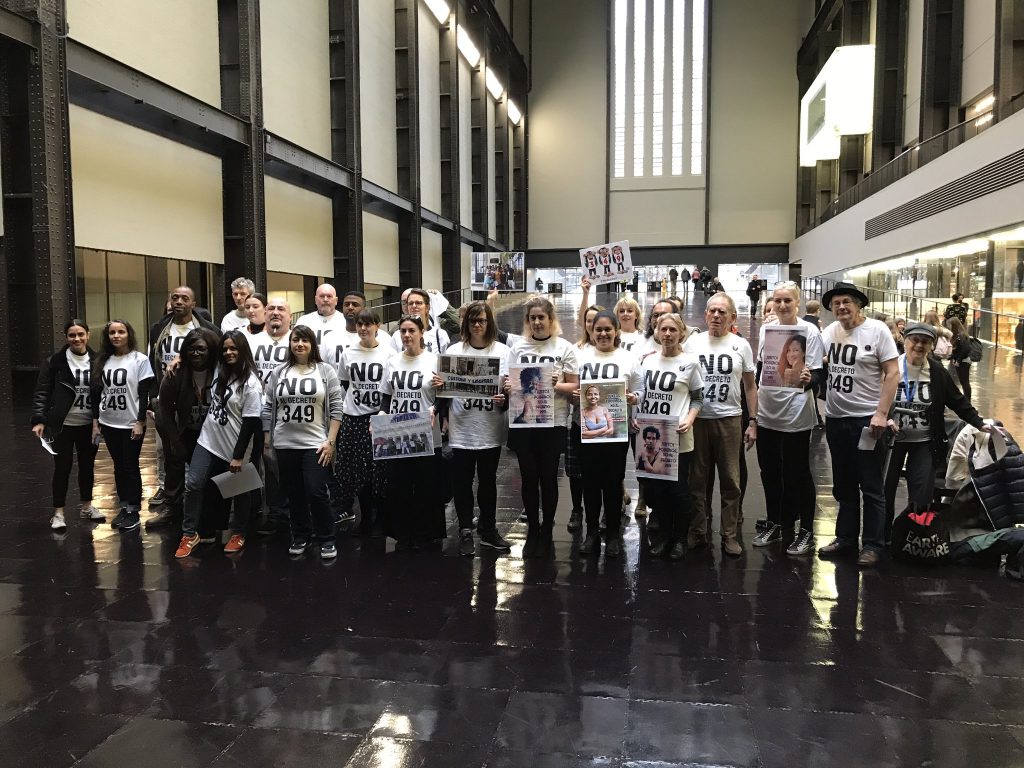
Update: All arrested artists have now been released, although they remain under police surveillance. Cuba’s vice minister of culture Fernando Rojas has declared to the Associated Press that changes will be made to Decree 349 but has not opened dialogue with the artists involved in the campaign against the decree.
Index on Censorship joined others at the Tate Modern on 5 December in a show of solidarity with those artists arrested in Cuba for peacefully protesting Decree 349, a law that will severely limit artistic freedom in the country. Decree 349 will see all artists — including collectives, musicians and performers — prohibited from operating in public places without prior approval from the Ministry of Culture.
In all, 13 artists were arrested over 48 hours. Luis Manuel Otero Alcantara and Yanelys Nuñez Leyva, members of the Index on Censorship Freedom of Expression Award-winning Museum of Dissidence, were arrested in Havana on 3 December. They are being held at Vivac prison on the outskirts of Havana. The Cuban performance artist Tania Bruguera, who was in residency at the Tate Modern in October 2018, was arrested separately, released and re-arrested. Of all those arrested, only Otero Alcantara, Nuñez Leyva and Bruguera remain in custody.
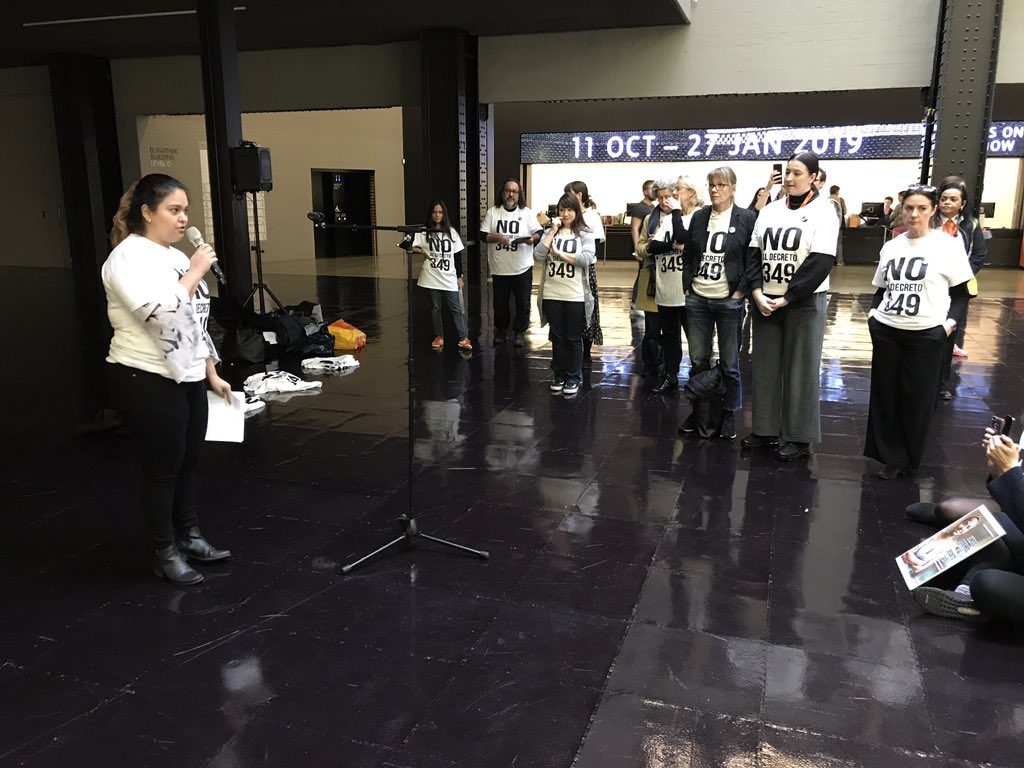
Index on Censorship’s Perla Hinojosa speaking at the Tate Modern.
Speaking at the Tate Modern, Index on Censorship’s fellowships and advocacy officer Perla Hinojosa, who has had the pleasure of working with Otero Alcantara and Nuñez Leyva, said: “We call on the Cuban government to let them know that we are watching them, we’re holding them accountable, and they must release artists who are in prison at this time and that they must drop Decree 349. Freedom of expression should not be criminalised. Art should not be criminalised. In the words of Luis Manuel, who emailed me on Sunday just before he went to prison: ‘349 is the image of censorship and repression of Cuban art and culture, and an example of the exercise of state control over its citizens’.”
Other speakers included Achim Borchardt-Hume, director of exhibitions at Tate, Jota Castro, a Dublin-based Franco-Peruvian artist, Sofia Karim, a Lonon-based architect and niece of the jailed Bangladeshi photojournalist Shahidul Alam, Alistair Hudson, director of Manchester Art Gallery and The Whitworth, and Colette Bailey, Artistic director and chief executive of Metal, the Southend-on-Sea-based arts charity.
Some read from a joint statement: “We are here in London, able to speak freely without fear. We must not take that for granted.”
It continued: “Following the recent detention of Bangladeshi photographer Shahidul Alam along with the recent murder of journalist Jamal Khashoggi, there us a global acceleration of censorship and repression of artists, journalists and academics. During these intrinsically linked turbulent times, we must join together to defend our right to debate, communicate and support one another.”
Castro read in Spanish from an open declaration for all artists campaigning against the Decree 349. It stated: “Art as a utilitarian artefact not only contravenes the Universal Declaration of Human Rights (Cuba is an active member of the United Nations Organisation), but also the basic principles of the United Nations for Education, Science and Culture (UNESCO).”
It continued: “Freedom of creation, a basic human expression, is becoming a “problematic” issue for many governments in the world. A degradation of fundamental rights is evident not only in the unfair detention of internationally recognised creatives, but mainly in attacking the fundamental rights of every single creator. Their strategy, based on the construction of a legal framework, constrains basic fundamental human rights that are inalienable such as freedom of speech. This problem occurs today on a global scale and should concern us all.”
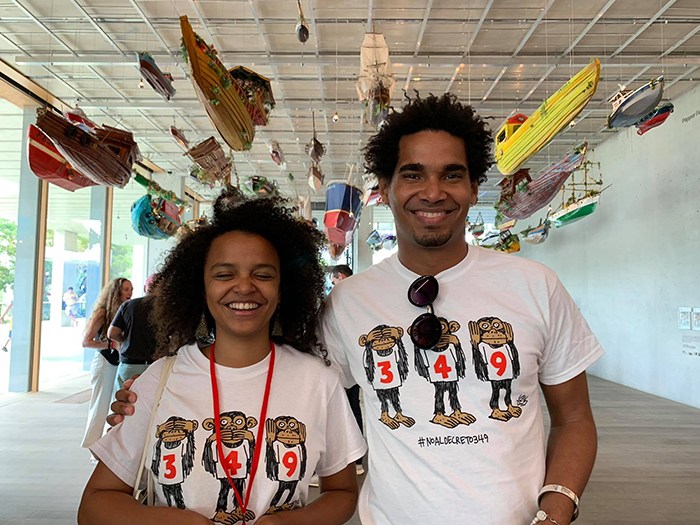
Cuban artists Luis Manuel Otero Alcantara and Yanelys Nuñez Leyva, members of the Index-award winning Museum of Dissidence
Mohamed Sameh, from the Index on Censorship Freedom of Expression Award-winning Egypt Commission on Rights and Freedoms, offered these words of solidarity: “We are shocked to know of Yanelys and Luis Manuels’s detention. Is this the best Cuba can do to these wonderful artists? What happened to Cuba that once stood together with Nelson Mandela? We call on and ask the Cuban authorities to release Yanelys and Luis Manuel immediately. The Cuban authorities shall be held responsible of any harm that may happen to them during this shameful detention.”[/vc_column_text][/vc_column][/vc_row][vc_row][vc_column][vc_basic_grid post_type=”post” max_items=”4″ element_width=”6″ grid_id=”vc_gid:1544112913087-f4e25fac-3439-10″ taxonomies=”23772″][/vc_column][/vc_row]
[vc_row][vc_column][vc_column_text]
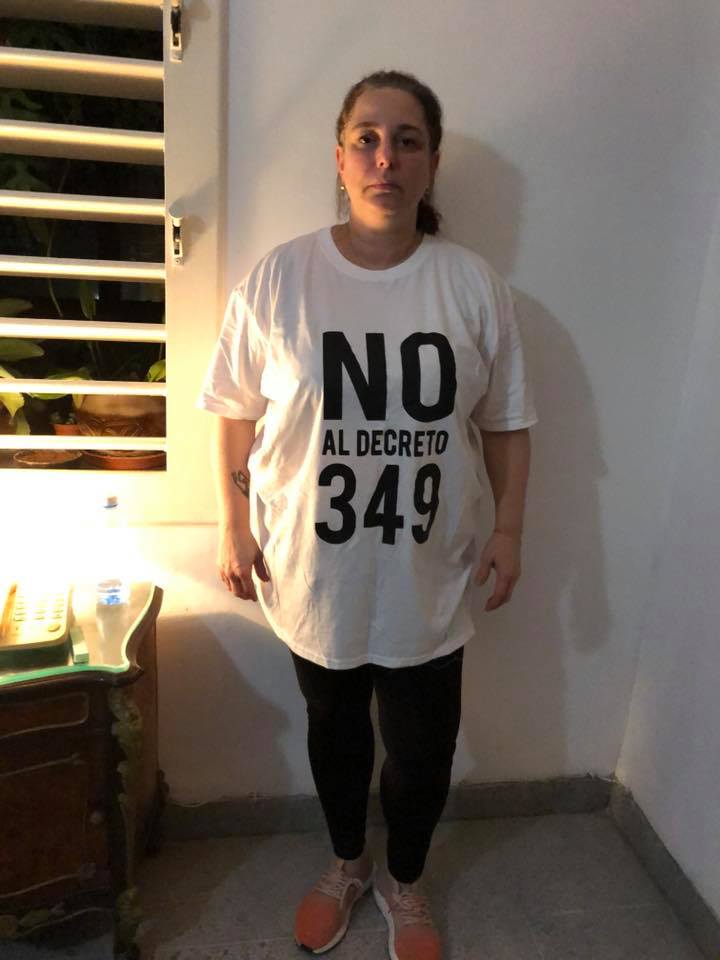
Cuban artist Tania Bruguera
Update: All arrested artists have now been released, although they remain under police surveillance. Cuba’s vice minister of culture Fernando Rojas has told the Associated Press that changes will be made to Decree 349 but has not opened dialogue with the artists involved in the campaign against the decree.
The following is an open declaration for all artists campaigning against the Decree 349, a law that will criminalise independent artists and place severe restrictions on cultural activity not authorised by the state. It will be read in solidarity at a gathering at Turbine Hall at the Tate Modern today from 1-2pm for those arrested this week for protesting the law. Those arrested include Luis Manuel Otero Alcantara and Yanelys Nuñez Leyva, members of the Index-award winning Museum of Dissidence, and Cuban performance artist Tania Bruguera. In all, 13 artists were arrested over 48 hours. Some have commenced a hunger and thirst strike.
The Cuban government intends to implement a regulation – commonly known as Decree 349 – which will subdue artistic and creative activity on the island, bringing it under the state’s strict tutelage. The content of the decree comprises two classical premises of any totalitarian state: the need for the artist to obtain prior authorisation for the exercise of his/her work and censorship of the creative process.
The execution of these two premises is to be overseen by an intricate structure of civil servants, subject to their discretion, thus reinforcing a “bureaucracy” which inhabits the language of revolutionary self-criticism.
The title of the decree reflects the particular vision that the Cuban government has about art because it refers to “the provision of artistic services”. If the purpose of art is to provide a service, then it essentially provides only to the regime and to no one else.
Art as a utilitarian artefact not only contravenes the Universal Declaration of Human Rights (Cuba is an active member of the United Nations Organisation), but also the basic principles of the United Nations for Education, Science and Culture (UNESCO).
The decree does not include anything new to the current practice of the Cuban government in the management of social engineering of its population, however, it offers a legal cover to a reactionary, ancient and regressive practice even in the field of those who consider themselves progressive. Nobody can deny the extraordinary achievement of Cuba in terms of providing basic necessities to its citizens, particularly provisions of health and education; this in spite of a setback of over fifty years, resulting from a political and economic embargo from the world’s most powerful nation. Under these conditions, creatives in Cuba were not only free to practice art but were actively promoted by the State and became a symbol of a global solidarity.
Ultimately, the freedom that is inherent to creative acts is something that a government whose only objective it is to remain in power, will be unable to tolerate. In adopting the act and implementing the decree, they will find themselves in a creative desert that will bore even themselves. The nomenclature living in their material comfort will seek to see Hollywood movies, instead of listening to their own propaganda.
Freedom of creation, a basic human expression, is becoming a “problematic” issue for many governments in the world. A degradation of fundamental rights is evident not only in the unfair detention of internationally recognised creatives, but mainly in attacking the fundamental rights of every single creator. Their strategy, based on the construction of a legal framework, constrains basic fundamental human rights that are inalienable such as freedom of speech. This problem occurs today on a global scale and should concern us all.[/vc_column_text][/vc_column][/vc_row][vc_row][vc_column][vc_basic_grid post_type=”post” max_items=”4″ element_width=”6″ grid_id=”vc_gid:1544094682847-9507be49-72bf-3″ taxonomies=”23772″][/vc_column][/vc_row]
Bruguera was one of a number of artists protesting the controversial Decree 349 which critics say will censor and limit artistic freedom. Read the full article.
[vc_row][vc_column][vc_column_text]
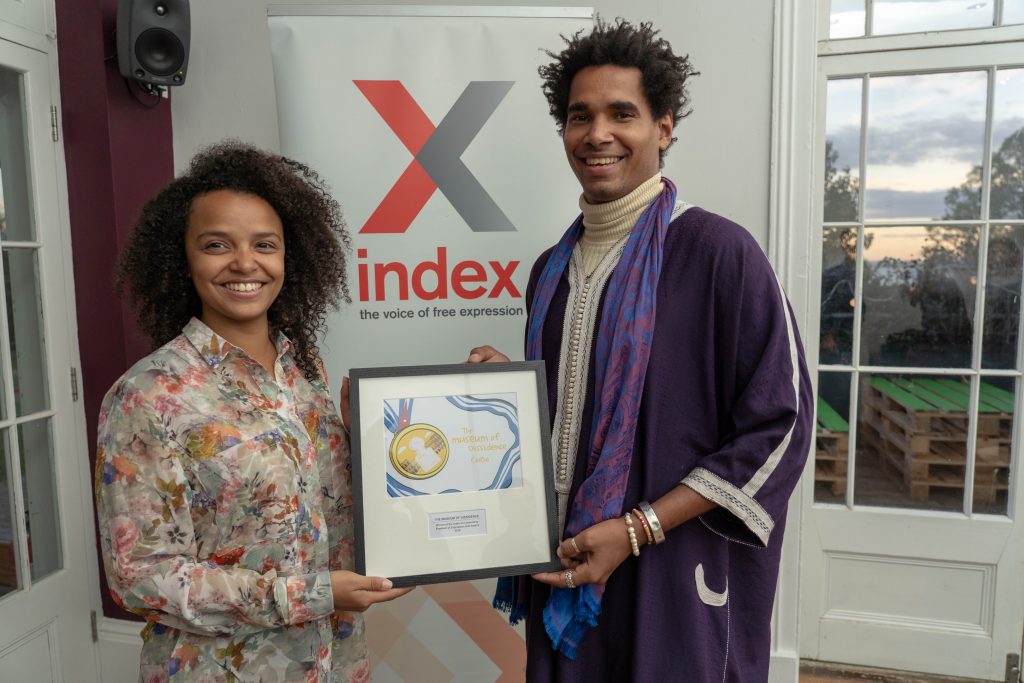
Yanelys Nuñez Leyva and Luis Manuel Otero Alcántara. The Museum of Dissidence
2018 Freedom of Expression Awards at Metal, Chalkwell Park, Essex.
Update: All arrested artists have now been released, although they remain under police surveillance. Cuba’s vice minister of culture Fernando Rojas has told the Associated Press that changes will be made to Decree 349 but has not opened dialogue with the artists involved in the campaign against the decree.
Index on Censorship calls for the immediate release of Cuban artists protesting against a decree they say could stifle creativity and increase censorship.
Members of the 2018 Index on Censorship Freedom of Expression Award-winning Museum of Dissidence, Luis Manuel Otero Alcantara and Yanelys Nuñez Leyva, are among those arrested and whose whereabouts are currently unknown. Performance artists Tania Bruguera was also detained.
Index fears for the artists’ well-being following reports of threats of violence by state security. There is a heavy police presence at the homes of artists who said they would be participating in the peaceful protest in front of the Ministry of Culture.
Otero Alcàntara and Nuñez Levya couldn’t make it to the Index awards ceremony in April but were in the UK to finally receive their award on 18 October at Metal arts centre in Chalkwell Hall, Southend. The Museum of Dissidence, a public art project celebrating dissent in Cuba, has constantly faced opposition, criticism and imprisonment for its art and activism.
“Luis Manuel and Yanelys have made clear that they want dialogue with the government to repeal this decree and include independent artists in the decisions that affect them. Criminalising art should never be an option. We call for the artists’ immediate release,” said Index on Censorship CEO Jodie Ginsberg.[/vc_column_text][/vc_column][/vc_row][vc_row][vc_column][vc_basic_grid post_type=”post” max_items=”4″ element_width=”6″ grid_id=”vc_gid:1544094896838-be240ea9-89bc-10″ taxonomies=”23772″][/vc_column][/vc_row]